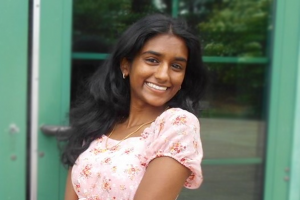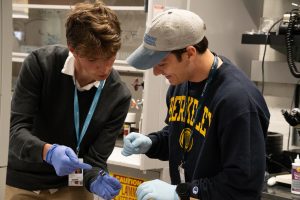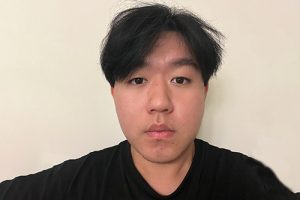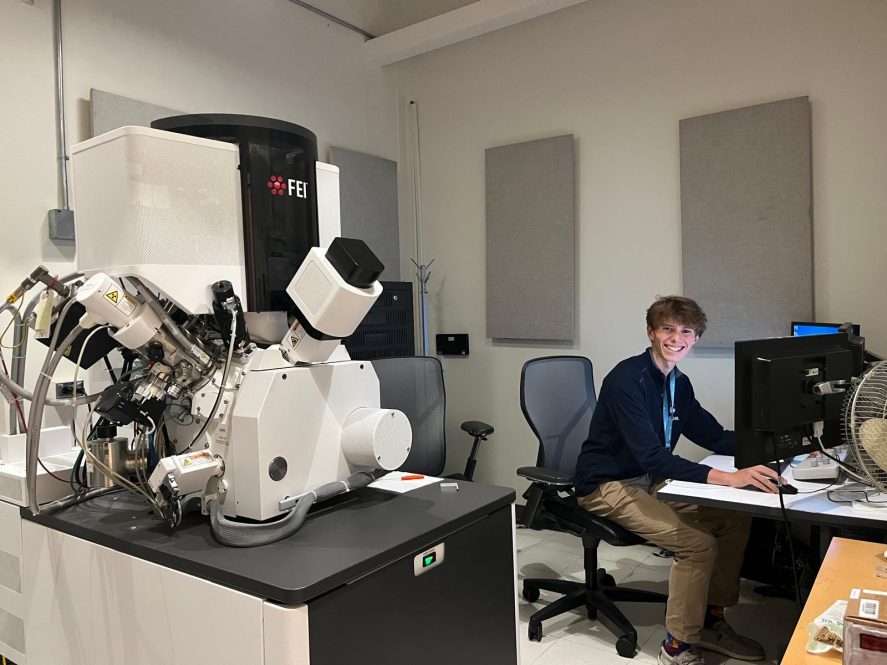As 2025 University Scholars, five College of Engineering students are spending their last three semesters pursuing personalized research projects.
Open to all undergraduate students, the University Scholar Program allows students to design an in-depth research or creative project and to craft a learning plan that supports their academic goals during their final three semesters. Each student is mentored by an advisory committee of three faculty.
Admission to the University Scholars program is based on an application submitted during the first semester of a student’s junior year. Applications are reviewed by an interdisciplinary committee of faculty members who may select up to 30 University Scholars in any given year.
Three of the five University Scholars and their projects are below:
Laxmi Chinmaya Vobbineni ’26
Project Title: The Synergic Role of Electrical and Chemical Stimulation in Wound Healing of Diabetic Patients

People with diabetes often have trouble healing from wounds. Since high blood sugar can damage blood vessels and weaken the immune system, white blood cells struggle to reach the wound. This can slow tissue repair and lead to ongoing inflammation.
Wounds may heal very slowly, become chronic, or leave scars—and this can be painful and expensive for patients.
University Scholar Laxmi Vobbineni ’26, a biomedical engineering and molecular and cell biology double major, is working to help diabetic patients heal from wounds faster by using chemical and electrical stimulation.
“Chemical stimulation, such as ion channel blockers, in conjunction with electrical stimulation may improve the wound healing process for diabetic patients,” she says.
By combining these treatments with an ionically-conductive biomaterial called scaffolding, ions can help restore electrical signals in the body that guide white blood cells to repair tissue.
“Our hope is to develop a system that has high potential for clinical use,” Vobbineni says.
Vobbineni’s advisors are Syam Nukavarapu, professor and department head in Biomedical Engineering; David Daggett, associate professor-in-residence of molecular and cell biology; and Sangamesh Kumbar, associate professor of orthopedic surgery at the UConn Health Center. She also interns at the UConn Health Center under Kumbar, working on projects related to the fields of tissue engineering and drug delivery.
Vobbineni, a member of the Society of Women Engineers and STEM Scholar Executive Board, volunteers as a nursing aide at the Hospital for Special Care in New Britain, Connecticut. She also holds an executive board position for the UConn FIRST (For Inspiration and Recognition of Science and Technology) Lego League Explore Program, which uses Legos and technology to excite youth about robotics and STEM.
Her involvement in FIRST began in middle school and high school and sparked her interest in innovation. “This is one of the reasons I decided to pursue biomedical engineering,” she says.
After graduation, Vobbineni plans to pursue medical school and work in the field of emergency medicine.
Wyeth Haddock ’26
Project Title: Developing a Copper-Based Medium Entropy Alloy with Enhanced Mechanical Properties for Space Applications

As a University Scholar, Wyeth Haddock ’26, a materials science and engineering major, is developing a structural material for use in extreme environments with potential applications in space exploration and nuclear energy.
His project focuses on synthesizing and analyzing an alloy made from copper, dysprosium, and yttrium (Cu-Dy-Y) that exhibits enhanced mechanical properties. By studying the alloy’s microstructure, phase stability, and mechanical behavior across temperature regimes, Haddock hopes to demonstrate improved material performance in extreme conditions and understand unique deformation behavior.
“If successful, the alloy could support the development of more durable materials for space exploration,” he says.
Haddock’s advisors include Seok-Woo Lee, associate professor of materials science and engineering and Director of Undergraduate Studies; and Yuanyuan Zhu, associate professor of materials science and engineering and director of the MSE Honors Program.
Haddock, an honors student from Fairfax, Vermont, is president of the UConn Running Club, and is a member of the UConn Materials Advantage Society, Tau Beta Pi Engineering Honor Society, Alpha Sigma Mu MSE Honor Society, and the ASM Board of Trustees. His jobs on campus include work as a campus tour guide and undergraduate teaching assistant. He recently served as a facilitator for the Honors First Year Experience program and as a Floor Mentor for the Honors 2 Opportunities Learning Community.
This summer, Haddock is a STROBE Summer Undergraduate Research Scholar at the University of California at Berkeley where he works in the National Center for Electron Microscopy at the Lawrence Berkeley National Laboratory.
“Throughout my UConn experience, I’ve immersed myself in collaborative communities, working in a lab, facilitating a first-year course, and traveling nationally to compete in running races,” he says. “These sorts of experiences have allowed me to further my learning, as I seek to positively impact the world around me.”
Haddock intends to pursue a Ph.D. in materials science and engineering, with an emphasis on understanding how atomic structure influences the properties of materials. He hopes to continue research in structural materials, developing the materials necessary for the complex demands of an evolving world.
Passionate about education and outreach, Wyeth also hopes to continually inspire younger audiences to get involved in materials science and engineering.
Zhengyang Wei ’26
Project Title: Stability Analysis on 9D Shear Flow Model by Small-Signal Finite-Gain Lp Stable Theorem

Turbulence—when fluid flow becomes chaotic—is difficult to control, but preventing it is important in many engineering systems. As a University Scholar, mechanical engineering major Zhengyang Wei ’26 is using mathematical tools to prevent turbulence by studying shear flows. In shear flows, layers of liquid or gas move parallel to each other but at different speeds.
By finding the conditions that keep the flow stable, Wei’s research can help improve the stability and performance of aerodynamic designs, industrial systems, and other applications. This work contributes to developing effective strategies for controlling shear flows and advancing fluid dynamics research.
“For example, we can mitigate the transition to turbulence in the wind over an airplane wing, which will make the flight more stable and efficient,” he explains.
His advisors are Chang Liu, assistant professor in the School of Mechanical, Aerospace, and Manufacturing Engineering; Reza Sheikhi, professor-in-residence in the School of Mechanical, Aerospace, and Manufacturing Engineering; and Jason Lee, professor-in-residence in the School of Mechanical, Aerospace, and Manufacturing Engineering.
As a member of the FLUids, rEduction, Nonlinearity, and Turbulence (FLUENT) Lab, Wei and Liu published a paper on shear flows in the June 2025 issue of arXiv.
Wei, a math minor, also is a 2025 Summer Undergraduate Research Fund (SURF) awardee. He plans to pursue a Ph.D. in fluid stability or optimization.
As University Scholars, Vobbineni, Haddock, and Wei receive a range of benefits designed to support and enrich their academic journey. These include a financial award that covers the General University Fee and Student Health Services Fee for up to three regular semesters, or until graduation from the program. Scholars are also eligible for course credit fee waivers for up to nine credits of summer or intersession courses, and the opportunity to enroll in graduate-level courses with instructor permission.
Students accepted into a UConn graduate program while in the University Scholar Program may begin working toward their graduate degree as undergraduates, with the ability to apply eligible graduate-level coursework toward that degree.
[Editor’s Note: This story was updated on Aug. 4 to reflect the fact there are five UConn Engineering 2025 University Scholars. Two additional scholars will soon be profiled.]



